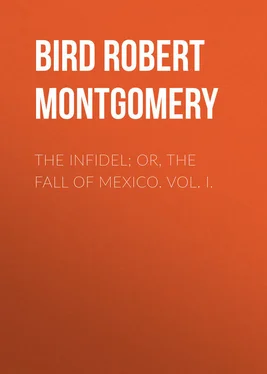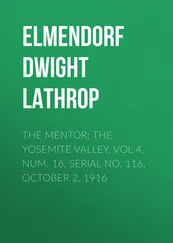Robert Bird - The Infidel; or, the Fall of Mexico. Vol. I.
Здесь есть возможность читать онлайн «Robert Bird - The Infidel; or, the Fall of Mexico. Vol. I.» — ознакомительный отрывок электронной книги совершенно бесплатно, а после прочтения отрывка купить полную версию. В некоторых случаях можно слушать аудио, скачать через торрент в формате fb2 и присутствует краткое содержание. ISBN: , Жанр: foreign_antique, foreign_prose, Историческая проза, на английском языке. Описание произведения, (предисловие) а так же отзывы посетителей доступны на портале библиотеки ЛибКат.
- Название:The Infidel; or, the Fall of Mexico. Vol. I.
- Автор:
- Жанр:
- Год:неизвестен
- ISBN:http://www.gutenberg.org/ebooks/34529
- Рейтинг книги:4 / 5. Голосов: 1
-
Избранное:Добавить в избранное
- Отзывы:
-
Ваша оценка:
- 80
- 1
- 2
- 3
- 4
- 5
The Infidel; or, the Fall of Mexico. Vol. I.: краткое содержание, описание и аннотация
Предлагаем к чтению аннотацию, описание, краткое содержание или предисловие (зависит от того, что написал сам автор книги «The Infidel; or, the Fall of Mexico. Vol. I.»). Если вы не нашли необходимую информацию о книге — напишите в комментариях, мы постараемся отыскать её.
The Infidel; or, the Fall of Mexico. Vol. I. — читать онлайн ознакомительный отрывок
Ниже представлен текст книги, разбитый по страницам. Система сохранения места последней прочитанной страницы, позволяет с удобством читать онлайн бесплатно книгу «The Infidel; or, the Fall of Mexico. Vol. I.», без необходимости каждый раз заново искать на чём Вы остановились. Поставьте закладку, и сможете в любой момент перейти на страницу, на которой закончили чтение.
Интервал:
Закладка:
The martial salutation from the town was answered by the whole train with a yell, filling the air, and causing the distant hills and lakes to tremble with the reverberation. In this, the ear might detect, besides the war-cry of Indians, "Tlascala, Tlascala!" the not less piercing shouts of Spaniards, "In the name of God and Santiago!" as well as the flourish of bugles, scattered at intervals among the train. If the broad Sea of Anahuac trembled at the sound, it was with good reason; for the clamour of triumph indicated the approach of those unknown naval engines, which were to plough its undefiled bosom, and convert every billow into the vassal of the stranger. On the shoulders of eight thousand Tlascalans, were borne the materials for the construction of thirteen brigantines, with which the unconquerable Spaniard, capable of every expedient, meditated the complete investment and the certain reduction of Tenochtitlan. The iron, the sails, and cordage of that fleet which he had caused to be broken up and sunk in the harbour of Vera Cruz, were added to planks, spars, and timbers from the sierras of Tlascala, and to pitch and rosin from the pinales , or pine-forests, of Huexotzinco, – a gloomy and broken desert, notorious, in the present day, as the haunt of bandits, the most brutal and merciless in the world.
The brawny carriers of these massive materials were protected, on the front and in the rear, by legions of their countrymen, armed, after their wild and romantic way, and clad in tunics of cotton or maguey cloth, with tiaras of feathers; who passed by in successive bodies of spearmen, archers, slingers, and swordsmen, arranged and divided in the manner of their Christian confederates. Besides these guards of front and rear, of whom the historian Herrera asserts, there were 180,000, while even the modest Clavigero computes their numbers at full one-sixth of this vast host, there were on either flank, bodies of picked warriors, marching in company with small bands of Spaniards, and personally led by distinguished Christian cavaliers. A military man may form a juster estimate of the numbers of the train, by being told, that it formed a line more than six miles in length, the whole marching compactly, and in strict order, so as to be best able to resist an attack of enemies.
The Spaniards under the cypress-tree, surveyed this striking spectacle with interest, but not with the grave wonder and absorbing admiration of men unfamiliar with such scenes. On the contrary, it was evident, from the tone of the remarks with which they wiled away the time of observation, (for it was many a long hour before the last of the train drew in sight,) that they were of that levity of spirit, or in that wantonness of mood, which can find matter for ridicule in the most serious of occurrences. Thus, they beheld, or fancied they beheld, somewhat that was diverting in the persons, or motions, of the stern and warlike Tlascalans, and especially in the zealous eagerness with which these barbarians strove to imitate the bearing and gait, as well as the evolutions, of their disciplined associates. Nay, their raillery was extended even to the Spanish portion of the train; and, sometimes, when a comrade passed by, if near enough to be made sensible of the jest, he was saluted with some such outpouring of wit, as put to the proof either his gravity or his patience.
These happy individuals, to whom we desire to introduce the reader, were five in number, and, with a single exception, though betraying none of the submissiveness of inferior personages, were evidently of no very exalted rank in the Christian army. Their attire was plain, and consisted, for the most part, of the cumbrous escaupil, or cotton-armour, over which, in the case of one or two, at least, were buckled a few plates of iron. Most of them had on their heads, helmets, or rather caps, of the same flimsy material, sometimes so thickly padded as to assume the bulk, as well as the appearance of rude turbans; all wore swords, and two had crossbows hanging at their backs. No distinction of station could have been inferred from their manner of discoursing one with another; and it was only by the morion of bright steel, richly inlaid with gold, on the head of one, and the polished hauberk on his chest, worn more for display than for any present service, that the wearer would have been recognized as of a grade superior to that of his companions. He was a tall and athletic cavalier, with a long chin, and cheeks broad and bony; and a singular and rather unpleasing expression was added to his countenance by eyes disproportionably small, though exceedingly black, keen, and resolute. A small, sharply peaked beard, – mustaches so thin, long, and straight, that they looked rather like the drooping locks of a woman than the favourites of a vain gallant, – a narrow but lofty forehead, on either side of which, divided and smoothed with effeminate care, fell masses of straight black hair, touched, yet almost invisibly, with the traces of matured manhood, – a small mouth, – a prominent nose, – and a complexion exceedingly dark, yet rather of the hue of iron than mahogany, completed a visage which a stranger would not have hesitated to attribute to a man of decided character, but without daring to determine whether that was of good or evil.
The individual who would have been the second to attract the notice of a wayfarer, owed this distinction rather to his personal deformity than to any other very striking characteristic. He was a hunchback, with much of the saturnine and sour expression which distinguishes the countenances of the deformed, and yet of a spirit so much belied by his looks, that he heard, recognized, and constantly replied to, without anger, the nickname of Corcobado , or the humpbacked, to which his misfortune exposed him. The most observable peculiarity in his countenance, was the uncommon length of his nose, which so far intruded upon the lower part of his visage, as to give this a look of age, which was contradicted, not only by other features, but by the prodigious muscularity of his shoulders and arms. It must be confessed, however, that his lower extremities were entirely unworthy to compare with the upper, being both so short and thin, that when he stood upon his feet, his arms crossed behind, – which was their ordinary position, – with the stout iron plates protruding from both back and breast, he looked rather like a bundle of armour and garments, exposed to the air and supported above the earth on two broken pikestaves or javelins, than a living and human creature.
The next individual was a man of good stature, who would have been considered, notwithstanding his grey hairs, the strongest man in the company, had it not been for his general emaciation and an expression of suffering on a countenance over which disease, contracted among the hot and humid swamps of the coast, had cast the sickliest hues of jaundice. Indeed, this discolouration, on a visage naturally none of the fairest, was of so deep a tint, that it had gained for the invalid, as well as for a whole ship's crew of his companions, the significant title of Ojo Verde , or the Green Eye. And here we may as well observe, that, in the army of Cortes, the wit which shows itself in the invention of such distinctions, was so prevalent, that there was scarce a man, from the general down to his groom or scullion, who had not been honoured by at least one sobriquet.
The fourth personage was a man of indifferent figure, remarkable for little save the marvellous sweetness of his eyes, which were set among features exceedingly sharp and harsh, and the volubility of his tongue.
The fifth sat apart from the others, a little down the slope of the hillock, with tablets in his hands, yet so plunged in abstraction, or so much wrapped up in the contemplation of the dark lake, the little piraguas dancing over its billows, and the far-distant turrets of the infidel city, that he seemed to have forgotten, not only the presence of his companions, and the passing procession, but the purpose for which he had drawn forth his writing implements.
Читать дальшеИнтервал:
Закладка:
Похожие книги на «The Infidel; or, the Fall of Mexico. Vol. I.»
Представляем Вашему вниманию похожие книги на «The Infidel; or, the Fall of Mexico. Vol. I.» списком для выбора. Мы отобрали схожую по названию и смыслу литературу в надежде предоставить читателям больше вариантов отыскать новые, интересные, ещё непрочитанные произведения.
Обсуждение, отзывы о книге «The Infidel; or, the Fall of Mexico. Vol. I.» и просто собственные мнения читателей. Оставьте ваши комментарии, напишите, что Вы думаете о произведении, его смысле или главных героях. Укажите что конкретно понравилось, а что нет, и почему Вы так считаете.












